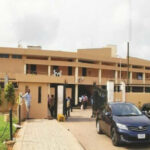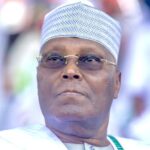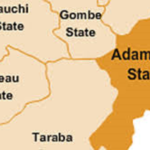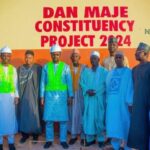
Okoi Obono-Obla, Special Assistant to the President on Prosecutions and Head of Special Investigation Panel for Recovery of Public Property, embodies the tragicomic disconnect between the Buhari administration’s self-construal of itself as an “anti-corruption” government and the cold hard fact of its deep embeddedness in and toleration of mind-boggling corruption of different shades.
Obono-Obla’s corruption started in the early 1980s. According to the Human Rights Writers Association (HURIWA), which painstakingly scrutinized his records, Obono-Obla possibly stole his dead relative’s “O” level certificate in 1982, fudged it to include Literature in English, which the dead relative didn’t sit for, used the result to gain admission to the university, and then changed his name decades later.
The dead relative was known as Ofem Okoi Ofem, the same name Obono-Obla bore until 2015, as I’ll show shortly. I viewed the photo attached to the statement of result from Mary Knoll College, Ogoja, Cross River State, that was issued to Ofem Okoi Ofem, and it looks nothing like the younger version Obono-Obla. So it is entirely plausible that Obono-Obla impersonated a dead relative. If this can be established conclusively, that would be a criminal offense on its own.
Obono-Obla’s probable criminal impersonation of a dead person is worsened by unassailable evidence ofhis criminal forgery of the relative’s school certificate. Ofem Okoi Ofem, whose certificate Obono-Obla used to get admission into the University of Jos, had four credits (C6 in English, A1 in Government, C4 in Bible Knowledge, and C5 in Economics), was absent for Literature in English, and got failing grades in Mathematics, Chemistry, and Biology.
The University of Jos, like most Nigerian universities, required (and still requires) five credits, including credits in English and Literature in English, to qualify to study law.Ofem Okoi Ofem’s school certificate fell short of these requirements, so Obono-Obla fudged the result. He fraudulently inserted C6 as the grade earned for Literature in English, which the original candidate didn’t sit for. That forgery achieved two things: it increased the credit passes of the certificate to five and satisfied the Literature in English prerequisite to study law. Obono-Obla used this falsified result to gain admission to study law of all courses! at the University of Jos.
We know all this because of the revelations that came out of the House of Representatives’ ad hoc committee that investigated “the legality of the operations of the special investigation panel for the recovery of public property.”
And this isn’t a case of mistaken identity. Every detail of the certificate Obono-Obla presented to the University of Jos-and to the presidency as a precondition for getting his job-matches the record kept at the West African Examination Council. His public profile also says he attended Mary Knoll College in Ogoja, and the year of graduation he indicated on his profiles is consistent with the record at WAEC. There is no question that it’s the same person.
In his testimony before the House of Representatives on June 6, 2018, WAEC’s Deputy Registrar, Femi Ola, said,“From our record, the genuine candidate is Ofem Okoi Ofem, 09403/247 of Mary Knoll College, Ogoja. The exam number and number of subjects are the same. The difference is the grade in English literature in which he claimed to have scored C6 despite being marked absent in the true, certified copy.” Daily Trust reported that the deputy registrar characterized Obono-Obla’s certificate as “fake, not genuine” and therefore invalid.
Perhaps in a bid to cover his tracks in anticipation of an “anti-corruption” job in the Buhari government, Ofem Okoi Ofemlegally changed his name to Okoi Obono-Obla in October 2015. The Cable of May 28, 2018 reported HURIWA to have found that “After he was called to the bar in 1991, Ofem Okoi Ofem, for reasons best known to him, changed his name to Okoi Obono-Obla. See the Deed of Change of Name (ANNEXTURE E) and confirmation of name change issued by the registrar of the Supreme Court on 15th October 2015.”
Apart from possible impersonation and proven forgery, Obono-Obla was also accused of corruption in the management of the finances of the presidential panel he heads and of blackmailing the people he was supposed to be recovering looted funds from with threats of media exposes if they didn’t offer him bribes. The allegations were credible enough to cause the Attorney-General and Minister of Justice, himself a coddler of corrupt people such as Abdulrasheed Maina, to fire him and to bar him from granting press interviews and issuing press releases in November 2017.
“Obla is also instructed to henceforth seek clearance from the AGF before granting any media interview or making press releases on official matters, while he is directed to promptly provide a detailed up-to-date report on the activities of the panel to the Minister for onward transmission to the Vice President, Professor Yemi Osinbajo,” the justice minister’s letter of November 5, 2017 said.
As is now the norm with Buhari when it comes to corruption involving people he perceives as “loyal” to him, Obono-Obla was reinstated and his press gag lifted.But, again, after a methodical and comprehensive investigation of Obono-Obla, which included a report from the Auditor-General of the Federation that confirms his financial indiscretions, the House of Representatives, on July 31, recommended that Obono-Obla be fired, arrested, and prosecuted for corruption and forgery. It also recommended that the University of Jos revoke the degree it awarded him and for the Body of Benchers to disbar him.
It is both depressing and comedic that one of the president’s points men in the “fight against corruption” is himself wrapped in multilayered, eye-watering fraud. As usual, nothing will happen to him. And that’s precisely why there is now a complete, irretrievable loss of faith not just in the government’s “anti-corruption fight” but in law and justice. Court orders are routinely disobeyed by government and corrupt people who are “loyal” to the president are protected from the consequences of their corruption.
Obono-Obla’s case particularly stands out like a sore thumb because he is supposed to be in the forefront in the “fight against corruption.”But corruption cannot fight corruption. As the late Dr. Martin Luther King Jr once said, “Darkness cannot drive out darkness; only light can do that.” You can’t be a criminal impersonator, an audacious certificate forger, and a venal public official who uses his position to defraud people and the country and claim to be an anti-corruption fighter.
Government apologists like to plagiarize the late Dr. Yusufu Bala Usman by calling any unmasking of government’s fraudulent anti-corruption fight as “corruption fighting back.” No, corruption isn’t fighting back. It’s more a case of corruption selectively fighting corruption. That’s a dead-end fight because it is rooted in crying injustice and double standard.
 Join Daily Trust WhatsApp Community For Quick Access To News and Happenings Around You.
Join Daily Trust WhatsApp Community For Quick Access To News and Happenings Around You.


